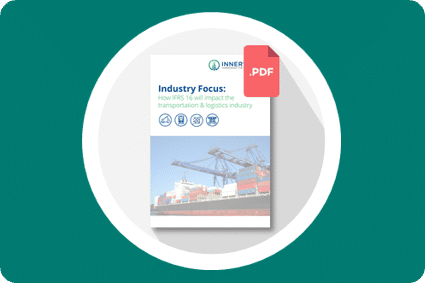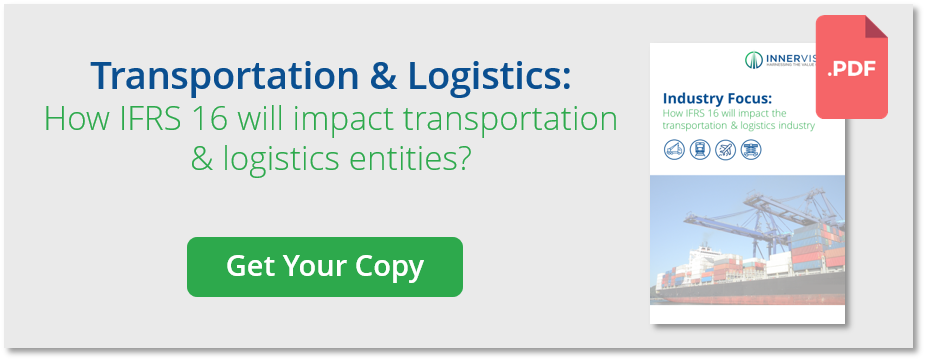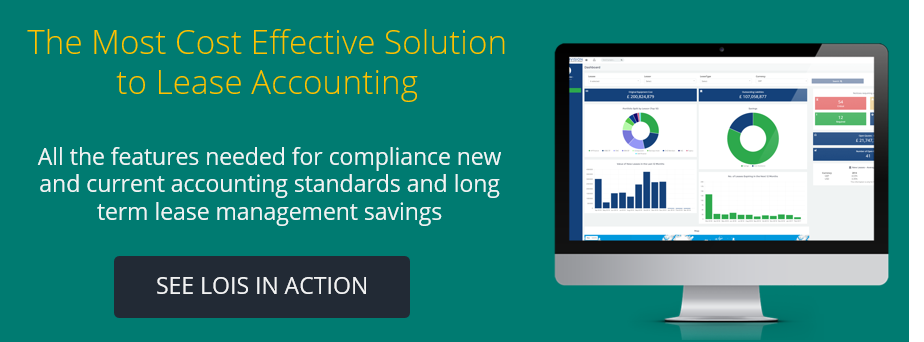BLOGS
Industry Focus: Evaluating the Impact of IFRS 16 on the Transport and Logistics Industry

Any company that uses leasing as a method to finance their assets will be impacted by the upcoming implementation of IFRS 16 and FASB ASC 842. However, the new lease accounting standards will have a more significant impact on certain industries, including those within the transportation and logistics sector.
As an industry that typically leases numerous fleets of vehicles and material handling equipment, companies within the transportation and logistics sector will see potentially considerable changes in their accounting and associated financial metrics.
Our leasing experts have created this short guide that uses transport and logistics industry-specific examples to highlight the impacts, challenges and potential benefits behind IFRS 16 implementation.
Click here for your copy
Under IAS 17, operating leases may currently be accounted “off-balance sheet”, but this accounting treatment will no longer be an option for most leases once the standards are implemented. Reporting periods following 1st January 2019 for IFRS 16 will require entities to recognise assets and liabilities that arise from their leases on balance sheet.
HOW THE TRANSPORTATION AND LOGISTICS INDUSTRY WILL BE IMPACTED:
-
Typically lease large number of big ticket items under operating leases
-
Potentially large impact on financial metrics, including debt, EBITDA and various ratios
-
Various lease agreements and documents spread across wide geographies will need to be centralised
-
Difficulty in separating lease and non-lease components within contracts
-
Various application methods to assess before implementation
See More: View the latest lease accounting changes and IFRS 16 updates
Although leasing still retains all of its benefits as an alternative to buying an asset outright, there will be a noticeable shift in terms of accounting treatment. With the anticipated impact on debt covenants, EBITDA, gearing ratios and stakeholder relationships, companies need to begin implementing preparatory processes to ease the transition to IFRS 16.
As such, transportation and logistics companies should look to running an initial impact report as soon as possible.
By visualising how key metrics will be altered in financial statements, these companies will be able to:
-
Determine the best transition options to suit their business's specific requirements (e.g. fully retrospective approach or modified cumulative catch-up method)
-
Begin negotiations and reassurances with stakeholder relationships that may be affected by the shift in figures
-
Accurately determine what processes are needed for a smooth and beneficial switch from IAS 17 to IFRS 16
See More: The importance of an early lease accounting impact assessment
With specialist lease accounting and management software, transportation and logistics professionals have the potential to not only reduce the hassle and complications involved in transitioning from IAS 17 to IFRS 16, but also have the chance to find savings opportunities throughout their leasing.
The first step of IFRS 16 implementation is to collect all your business’s leases. They need to be sourced, centralised and validated on one unified platform. Once there, the process of filling in data gaps and planning an efficient and timely implementation process can begin.
For more information about how transportation and logistics companies can run these critical impact assessments and organise a suitable, cost-saving and effective IFRS 16 implementation process, get in touch with Innervision's leasing experts for more lease accounting solutions here:











